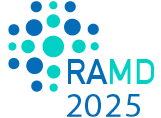Program
Adi Ickowicz | Congress Chair

Artificial intelligence (AI) and blockchain-enabled solutions are transforming healthcare delivery, catalyzing the shift from reactive treatment models to proactive, precision-based care. By enhancing accessibility, personalizing clinical decision-making, improving efficiency, reducing errors, and offloading administrative burdens, these technologies are driving a smarter, more patient-centered healthcare ecosystem.
Dr. Al-Siddiq will explore real-world applications of AI, including how predictive analytics is advancing clinical decision making and how adaptive diagnostics are enabling personalized patient care. He will also examine how blockchain strengthens data security, promotes transparency, and drives seamless interoperability across healthcare systems.
While these technologies promise significant advances in patient outcomes and operational efficiency, they also introduce complex challenges. This presentation will provide an overview of current regulatory approaches from agencies such as the FDA, highlighting emerging frameworks aimed at balancing innovation with patient safety. Critical issues, including AI algorithm transparency, machine learning validation, cybersecurity risks, and the governance of decentralized data must be addressed to ensure safe and effective integration.
Attendees will gain actionable insights into navigating regulatory gaps, managing compliance risks, and fostering collaboration across industry and regulatory bodies. Strategic approaches for responsible digital transformation will be discussed, offering a roadmap to harness the full potential of AI and blockchain in the evolving healthcare landscape.


Medical Affairs, Consultancy, Advisory, Germany



PharmD, ERT, DABT | Senior Toxicologist – NAMSA, France



PharmD, ERT, DABT | Senior Toxicologist – NAMSA, France

Medical Affairs, Consultancy, Advisory, Germany

Head of EU Grants Department, Inveniam Group, Spain
Navigating regulatory affairs is essential for the success of EU-funded research and innovation projects, from proposal preparation to post-grant management. This lecture will explore the strategic role regulatory considerations play in securing and implementing funding under key European Commission programs, such as the EIC Pathfinder, Transition, and Accelerator, under the Horizon Europe framework program. Emphasis will be placed on how a well-defined regulatory strategy can significantly enhance the competitiveness and feasibility of proposals. The session will also examine the structure and ongoing management of dedicated Work Packages focusing on regulatory, intellectual property (IP), and exploitation aspects. Through real-case scenarios, participants will gain insights into aligning these elements with project deliverables, milestones, and broader exploitation goals to ensure long-term impact and compliance. Finally, we will address the critical role of regulatory affairs in the negotiation and execution of Consortium Agreements and Exploitation Agreements. These contractual frameworks define the responsibilities, rights, and obligations of project’s partners, and incorporating regulatory considerations early can mitigate risks and support a smooth transition to market or further development stages. This lecture aims to provide practical guidance and strategic insights for researchers, project managers, and innovation stakeholders engaged in EU-funded projects.

As the global burden of chronic disease rises and healthcare systems shift toward preventive and personalized care, consumers are becoming increasingly proactive about managing their health. This has fueled demand for wearable medical devices and digital health technologies that support continuous monitoring, early detection, and long-term disease management.
From ECG-enabled smartwatches and wearable glucose monitors to AI-driven biosensors and remote patient monitoring, these technologies can collect high-resolution physiological data, delivering real-time clinical insights directly to patients and providers. As the sophistication of these devices accelerates, so must the regulatory frameworks that govern them. Ensuring that approval pathways, post-market surveillance requirements, and clinical validation strategies evolve in parallel is essential to safeguarding patient safety, maintaining public trust, and supporting the integrity of health outcomes driven by digital innovation.
This session will provide an examination of the regulatory considerations critical to the success of wearable devices across key markets, focusing on the U.S. FDA and European Union’s Medical Device Regulation (MDR) risk-based approach, and emerging global standards. Dr. Al-Siddiq will explore regulatory pathways for software as a medical device (SaMD), cybersecurity requirements, clinical evaluation and real-world evidence strategies, and evolving post-market surveillance.
The session will also address how regulatory agencies are adapting frameworks for AI-enabled wearables, continuous physiologic monitoring, and patient-generated health data. Attendees will gain practical insights into pre-submission engagement strategies, evidence generation best practices, and proactive compliance approaches that accelerate approvals while minimizing regulatory risk.


